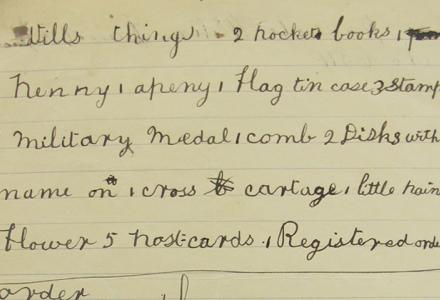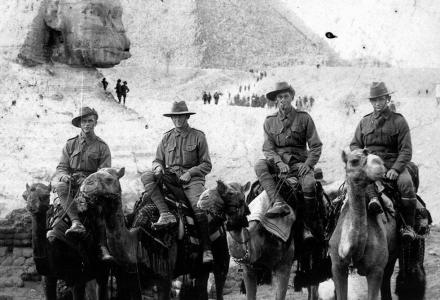Nearly five thousand Australian and New Zealand troops were taken prisoner on the Western Front. Conditions differed in every camp but by the end of the war their situation was appalling.
Contrary to the Geneva Convention, men were put to work at the front. They were forced to dig dugouts, repair trenches and carry shells to the firing line. Across Germany, POWs worked on ‘Commandos’. They felled forests, tilled fields and toiled in salt mines to aid the Central Powers’ war effort.
The prisoners’ rations and supplies were poor and inadequate. Often they were issued with just one blanket for the winter and received no new clothing for months on end. The only meat prisoners tasted was horse flesh, animals who had died of exhaustion or been ‘badly blown about at the front’. What comfort came to these men? Who kept them alive in these horrendous conditions?
In 1916, Mary Elizabeth Chomley established the Red Cross Prisoner of War Department in London. She had journeyed to Britain on the outbreak of war, determined to ‘do her bit’ for Australia and the Empire. Methodical, efficient and with an insatiable appetite for work, Miss Chomely managed a team of around thirty volunteers. Most—like her—were expatriate women from Australia, many had sons, brothers or husbands serving overseas.
The Red Cross Prisoner of War Department packed parcels of food, medicine and clothing to prisoners languishing in Germany. Though every package varied, parcels usually contained tea and tobacco, butter, biscuits and bread, sugar, condensed milk, cheese, camp pie and sometimes dripping. Thousands of these parcels were dispatched every week to Prisoner of War camps across Europe. They kept these hungry men alive and buoyed up their spirits.
Men asked for books, described tinned butter as a ‘great treat’ and pleaded for more tobacco. One wondered if it would be ‘asking a little too much’ to request a decent football.
In more ways than one, Miss Chomley and her ‘girls’ built a lifeline to Australia. It wasn’t just that she arranged for lonely prisoners to be ‘adopted’ by Australians back home. Chomley restored men to families far away, resuming conversations cut short by captivity. Thanks to Miss Chomley correspondence between Australia and the prison camps travelled both ways across the oceans.
Men dubbed Miss Chomley ‘the Angel of the prison camps’. They called themselves her ‘big family of boys’ and addressed her as they would their mother. Many sent their photographs. All longed to meet her. A maternal figure she may have been, but Mary Chomley couldn’t help everyone. The British Red Cross offered relief to ‘British’ troops alone. Disowned by their government, Russian prisoners starved in their thousands.
Nor did Miss Chomley extend comfort to the enemy.
By the end of the war, the German Army fought on the verge of starvation—that was one of the reasons prisoners were treated so badly. Guards scavenged in bins for scraps from prisoners’ parcels, and blockaded by the Allied navies, the country was starved into submission. By 1919, starvation and the influenza epidemic that followed the war had claimed the lives of more civilians than men killed on the battlefield.
Not all of Miss Chomley’s ‘boys’ survived the war. Although 2,682 prisoners of war returned to Australia, around eight per cent died in captivity in Germany, most from wounds received in the fighting.
Miss Chomley herself was awarded an OBE for her war work. But not everyone was prepared to award a woman her fair share of recognition. Mary Chomley’s name was somehow omitted in Australia’s Official History of the War and management of the Red Cross Prisoner of War Department attributed to a Mr Fairburn.
Chomley’s story reminds us of the physical and emotional labour women undertook in wartime. It shows the way war confused traditional gender roles at the same time as it reinforced them. Miss Chomley may have been called a ‘mother’ but she wore a mannish uniform. Although men described her as the ‘Angel of the Prison’, women like Miss Chomley challenged Edwardian conventions of femininity, claiming an authority and a purpose seldom seen before wartime. Chomley herself was something of a paradox, at once ardently imperialist and always proudly Australian. Finally, and perhaps most importantly, Chomley’s work offers insight into what some historians have called the forgotten soldiers of the Great War: men on all sides who languished in prison camps.
For full attribution of sources, suggestions for further reading and an extended version of the story itself see ‘The angel of the prison camps: Mary Chomley’ in Bruce Scates, Rebecca Wheatley and Laura James, World War One: A History in 100 stories (Melbourne, Penguin/Viking, 2015) pp. 178-183; 358.



